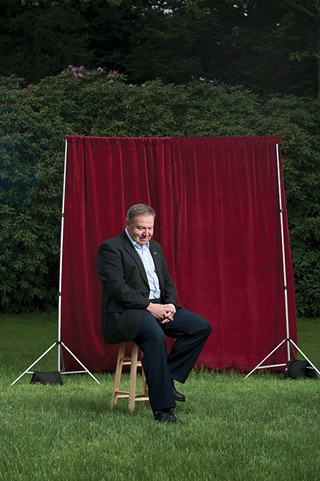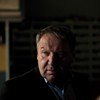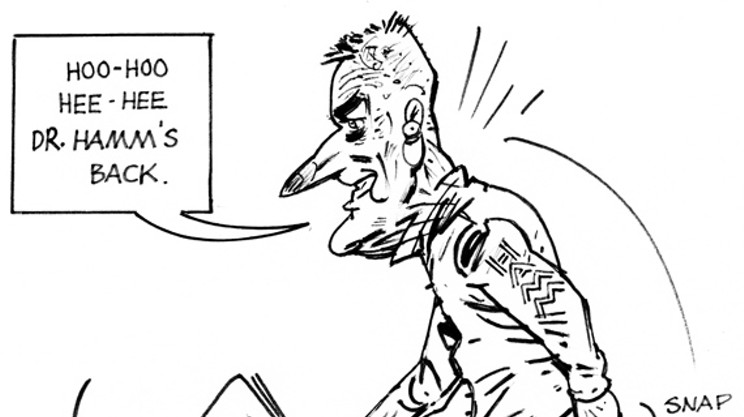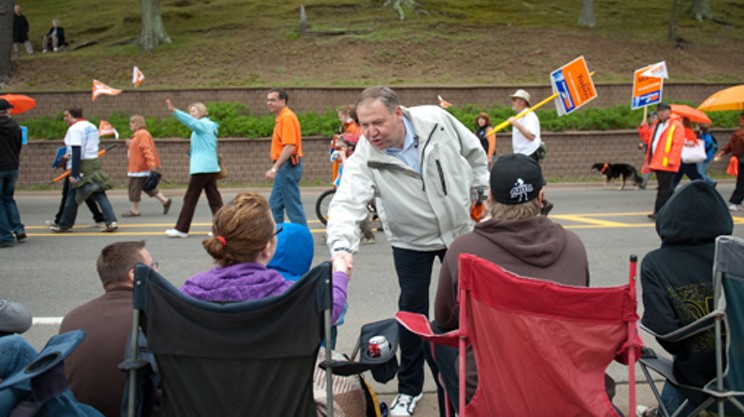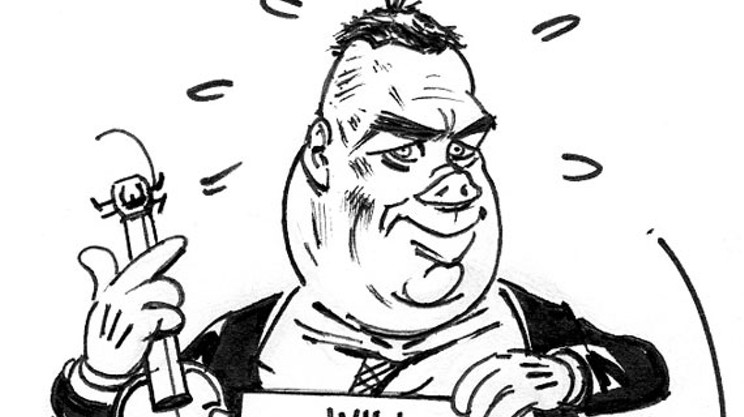Darrell Dexter is telling me a story. It's about Dennis Mackie, the brother he didn't know he had. It was 1994 and Rick, one of the two brothers he'd actually grown up with, had just telephoned him at home.
"Are you setting down?" Rick asked. Darrell wasn't. "Well, set down then. We're going to the airport," Rick informed him, then paused a beat..."to meet our brother."
Their brother? Alan wouldn't have been on an airplane. "Where's Alan?" Darrell demanded.
"Not Alan."
Not Alan? "What?"
"I'll pick you up and explain it all on the way to the airport."
Today, Dexter looks up, shrugs. "I don't know if you can use that in your story, but..."
It turns out that Darrell's father, Elvin, had a relationship with a British woman while serving overseas during World War II. In 1944, they had a child, Dennis. The complication was that Elvin was already married, with a wife and two children back in Canada.
After returning to Nova Scotia in 1945, Elvin confessed his infidelity to his wife. Though "naturally upset," Florence convinced herself her husband could have remained in England but had chosen instead to come back to her and their children. In the mysterious, never-completely-knowable ways of marriage, Elvin and Florence came to terms with what had come between them, and moved on with their lives.
Mostly.
Though they kept the information secret from family and friends, they did write to Dennis' mother, offering to take her baby and raise him as their son. While Dennis' mother demurred, she did send them a letter when Dennis was old enough for school. He needed shoes, she wrote. Elvin and Florence rushed out, bought a new pair and shipped them to England.
After that...nothing. No contact. "Why interfere?" was Elvin's succinct explanation when Darrell asked about it 50 years later.
But this missing family puzzle-piece helped Darrell Dexter put his own childhood in context. It explains, for example, why Elvin and Florence decided to adopt Alan in 1949 even though they already had two children of their own and would later have two more (including Darrell, who was born in 1957). "They felt that if someone else was raising my father's child in England, the least they could was raise someone else's here," Dexter tells me, then laughs. "Cosmic karma." It also explains why, when Darrell was in Grade Two and his father---who was working in a mill near their Milton, Queen's County, home---landed better-paying work at the Halifax shipyard, Florence insisted on moving to the city with him. "Mother didn't want to be away from her husband again."
Meanwhile, in England, Dennis Mackie grew up, joined the British army, became a paratrooper, retired and bought a vegetarian bed and breakfast. When he turned 50, he set out to find his birth father. He eventually found the phone number and called. Florence answered.
"You don't know who I am," he began. "My name is Dennis Mackie---"
"Oh, Dennis," Florence cheerily cut him off. "I know exactly who you are."
Dennis explained he just wanted a chance to meet his father, spend a few hours with him. "No one else needs to know," he said.
"Dennis," the now-76-year-old Florence replied. "This is ridiculous. You need to come and meet your family."
Which is how Darrell and Rick Dexter came to be standing outside the international arrivals area in the Halifax International Airport one afternoon in 1994 waiting to meet the 50-year-old brother they had not previously known existed.
"When he came through customs, my brother and I looked at one another," Dexter tells me. "No DNA testing required! He was the spitting image of my father."
The family reunion went well---"we went to a hockey game, he met my wife and son"---and they have a continuing relationship. But Dexter admits it all took time. "It was a good object lesson," he adds. "I remember walking away thinking to myself, whenever you think you know everything..."
I will confess I was thinking much the same thing. And wondering why Darrell Dexter was telling me this story, especially now, in mid-April with a provincial election campaign expected to be called any day.
In part, of course, it was because I had asked. "Tell me about yourself," I'd begun, and I'd told his aide I wanted to write a personal profile of the man. Maybe Dexter, who'd trained as a journalist, was trying to help out by offering up a little-known personal anecdote.
Or perhaps it was more calculated than that. I was interviewing him the day after a Liberal party operative sent the CBC internet photos of a topless Lenore Zann, the Truro-raised actor who'd just been announced as the NDP's candidate there. Dexter, in fact, had to excuse himself midway through our interview to talk with CBC-TV reporter Paul Withers about the Zann photos. Perhaps Dexter was being pre-emptive, trying to prevent some political opponent from turning his innocuous, happy-ending personal story into a tawdry, tabloid-style headline: "Dexter has secret love-child brother." These days, better to get everything out there.
Or perhaps...perhaps I was reading way too much into it. Maybe Darrell was just being Darrell, the rumpled, friendly, what-you-see-is-what-you-get guy you'd like to swap stories with over a pint or two down at the local. But the truth is Dexter and I know each other only as journalist and politician, our conversation took place not in a tavern but in his leader's office on the 10th floor of the Centennial Building in downtown Halifax and the only beverage on tap was water.
Still, the question of his motivation is more important than it may seem at first. On Tuesday we go to the polls in the province's 38th general election, and many voters are still puzzling through the question of who Darrell Dexter really is and, more importantly, who he will turn out to be if we do the once-unthinkable and the still-almost-unimaginable and elect our first-ever New Democratic Party government on June 9, making Darrell Dexter our 27th premier.
Many Nova Scotians of a certain age are still getting their heads around the March 11 headline in the Halifax Herald: "NDP Will Win Next Election," it declared flatly, basing its conclusion on the results of the latest public opinion poll.
Darrell Dexter is, of course, a Nova Scotian of that certain age---and knows all too well his party's history of marginalization, of moral victories, of defeats snatched from the jaws of victory, of "Nova Scotians would never..." of almost...of next time.
Dexter's political baptism came as a 22-year-old student when he volunteered in Alexa McDonough's quixotic 1979 federal election campaign. She finished third, par for the NDP in those days. By the time McDonough finally won a seat in the provincial legislature---becoming its lone MLA---two years and three elections later, Dexter was in the navy and stationed on the other coast. "I saw it on the news," he says.
He didn't become fully active in partisan politics until 1988 when, back in Halifax and working as a lawyer, he volunteered in the provincial election campaign. At the time the party---pale shades of today---was optimistic about making a modest electoral breakthrough. John Buchanan's patronage-riddled, 10-year-old Tory government seemed vulnerable; the Liberal opposition was a mess. But the wily Buchanan punctured the NDP's hope-balloon by coupling his election announcement with news that the star NDP candidate, a young lawyer named Bob Levy, was dropping out to accept---what else?---a patronage appointment to the bench.
"It was devastating," remembers Dexter, who'd spent much of the week before in the party's Halifax office confidently putting together candidate binders for the campaign.
It took a decade for the party to recover. By 1998, the NDP had a handsome, dynamic young leader in Robert Chisholm and its workers were on a high following their unexpected success in a federal election the year before; they'd won six of 11 Nova Scotia seats. The Liberals, by contrast, had dumped their own leader, premier John Savage, before he'd even completed his first term. And the new Tory leader, a country doctor named John Hamm, was little known beyond his own riding.
Dexter, who'd won election as a Dartmouth city councillor four years before, was the NDP's provincial campaign chair and sacrificial candidate in Dartmouth-Cole Harbour. "I was taking on the minister of justice in a riding in which I didn't live at the time," he recalls of the odds against him. His law partners wished him well, but coupled it with a confident, "See you in 38 days."
Dexter campaigned relentlessly, following what he called the "two housecoat rule," knocking on doors into the night until he encountered a second woman dressed in her housecoat. "Then I knew it was too late to keep knocking on doors." He began to realize something seismic was shifting when, shortly before voting day, a local radio poll showed the NDP winning all three Dartmouth ridings, including his.
In the end, the NDP won 19 seats---Dexter's among them---putting them in an electoral dead-heat with the incumbent Liberals who somehow managed to cling to power for another year before finally calling another election.
The NDP seemed primed to win government. But news of Chisholm's failure to tell the truth about a minor personal indiscretion---as a young man, he had been convicted of drinking and driving---spilled out during the final days of the campaign, and the party's governing dream disappeared.
There are plenty of people today, including many New Democrats, who say that losing in 1999 was the best thing that could have happened to their wannabe governing party. "If they'd won," agrees Brian Flinn, the political reporter for allnovascotia.com, "they would have tried to run a classic NDP government. They would have come into office trying to change everything all at once. They'd probably have blown it and then they'd be gone. Forever."
Acknowledges a current NDP strategist: "The 11 seats we actually won in 1999 is probably a more accurate reflection of what our real support was at the time. Being the official opposition gave us the chance to grow more slowly."
There were some stutter steps along the way. After Chisholm resigned following the 1999 defeat, the party chose Helen MacDonald, a former Cape Breton MLA who couldn't even get herself re-elected. She was forced to quit after a year of political infighting and a caucus revolt.
Dexter---modest, easy-going and well regarded in party circles because of his years of behind-the-scenes work---became interim leader in 2001.
But the day he announced he was running for the job permanently, he was blindsided by an email alleging he had also been convicted of drunk driving as a 19-year-old. Dexter wisely didn't duck the issue. "I don't make excuses and, from the day it happened, I took responsibility for my own actions," he told the Daily News. But then he put the story into context: "I don't think this is important to anybody. There are all kinds of things that are important to people's lives and something that happened to me 25 years ago isn't one of them."
The next year, Dexter handily won his party's leadership convention and began the slow process of remaking the party in his own image.
If you want to understand what kind of premier Darrell Dexter will be, you need to go back and consider again his personal history beyond the story of the brother he didn't know he had.
Because of Florence's decision to follow Elvin to his new job in Halifax, Dexter grew up with one foot in the city, the other in rural Nova Scotia. He spent the school year in working-class, north end Halifax, then the day school ended decamped to spend summers with his grandparents and extended family in Milton. That lasted until Grade 9, when his grandfather died and the family moved back to Milton so his mother could look after his grandmother.
By then, Darrell, an outgoing, athletic kid, had already established himself in north end Halifax. He had a paper route and his last delivery of the day was to CJCH radio. There he'd kibitz with the station's morning man, Jerry Lawrence, who later became a Tory cabinet minister, and Walter Fitzgerald, the sportscaster who went on to be mayor and a Liberal cabinet minister. Lawrence would sometimes spontaneously interview him on air about "kid stuff." Afterwards, Darrell would wander into the newsroom and argue with Fitzgerald over his wrong-headed choice of "sports hero of the day." "I was always plugging for the Montreal Canadiens," Dexter remembers. On his final day as a paper carrier, Fitzgerald urged Darrell to listen to his sportscast the next morning. "He made me his sports hero of the day," Dexter remembers with a mix of nostalgia, pride and respect for the kindness of an adult who would do such a thing for a kid who was "probably more a nuisance than anything else."
After enrolling at Liverpool High, Dexter says he "took the academic road less travelled. I'd look for any excuse not to study."
I ask Dexter about an old CBC-TV profile of him I'd recently seen on YouTube. In it, a high school friend named Dan Hatt recalls that as early as Grade 10, Dexter had predicted that when he grew up he was going to be "the NDP premier of Nova Scotia."
Dexter laughs. "I know Danny wouldn't lie," he says, "but I certainly don't remember that."
He does remember flirting briefly with the NDP, but not out of any ideological commitment. "I was interested enough in politics to go to the local nomination meetings for all three parties. The meetings for the two mainstream parties were packed; the NDP nominating meeting was in a union hall and there were maybe eight people in total." Reasoning that the other parties had "all the help they needed," Dexter volunteered for the NDP. His actual participation in the campaign, he allows, was "modest."
After high school, Dexter attended university, mostly because his friends did. He preferred social life to classes. "He was a ladies' man," says Tom Regan, a fellow student who is now the acting executive director of the Online News Association in Washington, DC. "He was a fun guy to be around because he was always willing to try anything."
He barely "scraped through" first year, earning only four of five credits. Not that he cared. He wasn't planning to go back. He'd landed a well-paying union summer job at the Teleglobe telecommunications facility in Mill Cove and hoped to stay on. But one morning in August, Dexter was digging a cable trench with his usual enthusiasm when his foreman advised him to take it easy. "I've been here for 21 years," the man said, "and every day I come to work, the ditch is still here."
Twenty-one years? Dexter tried to imagine himself still digging trenches in 21 years. "Even at union wages," he asked himself, "do I really want to do that?"
That night, Dexter rummaged around under his bed to find where he'd dumped his university re-enrolment forms.
Not that he suddenly became a committed academic. This time, he got waylaid by student politics, winning the election as the external vice president of the King's College students' union. That gave him the opportunity to travel to conferences and meet other passionate, committed young student politicians, including Dan O'Connor, then the executive director of the National Union of Students and now Dexter's chief of staff and the architect of the current election strategy.
At one point, Tom Regan, whose uncle was Liberal premier Gerry Regan, remembers dragging Dexter to a Liberal party convention. They briefly became involved in the youth wing's constitution committee but "it didn't take. Even then," Regan says now, "his thinking was more to the left of centre, more NDP."
Dexter's undergraduate years came to an awkward end. He still needed a credit for the course he'd missed in first year but the university wasn't keen to allow him to take six in his final semester, probably because he hadn't done all that well in the courses he'd passed. So he decided to continue in school, combining his final BA credit with courses for a bachelor of education degree. There were no jobs for teachers when he finished, so he then signed up for the new one-year bachelor of journalism program at King's.
His most memorable moment in journalism school came during the Iran hostage crisis when Dexter and two fellow students---Marty Cohn, now the Toronto Star's deputy editor, and Kerry DeLorey, a Halifax photographer---decided, on a whim, to call the American embassy in Tehran in faint hopes of getting a radio interview. Surprisingly, someone answered the phone: "American Nest of Spies," the voice said. Though that was the extent of the scoop, the CBC quickly picked up their tape and story of the call.
Not that it helped Dexter. He was supposed to have been part of the first journalism graduating class in 1981, but wasn't because he couldn't pass the school's modest French language comprehension requirement. (He finally got the degree two years later after much tutoring.)
Armed with his BA and his two other almost-degrees, Dexter was trying to figure out what to do next when a navy recruiter suggested a career as a military public affairs officer. Dexter signed up and was sent to the west coast.
There, he met his wife Kelly---"still the love of my life," he says with genuine affection---on the barracks' front lawn. She was doing the "military option" at Katimavik, a federal post-high school volunteer program, while she figured out which university she wanted to attend. Dexter convinced her to go to King's, his Halifax alma mater. Shortly after, Dexter left the navy and followed her back east so they could get married and so Darrell could embark on yet another new career plan: he would become a lawyer.
To make ends meet while he waited to get into Dal law school---he scored in the top 14 percent on his admissions exam but had to upgrade his undergraduate marks and earn tuition---Dexter did a stint as a reporter at the Daily News. It was not an entirely happy experience. At one point he got threatened with a lawsuit for something he didn't write: On an innocuous story of Dexter's about a local restaurant, the editor decided to add---under Dexter's byline---some critical comments of his own about the establishment's food. "You should have seen the look on Darrell's face when he came to work the next morning," Tom Regan recalls. The incident was eventually settled out of court.
For his part, Dexter remembers that, "when I left, [publisher David] Bentley told me, 'Come back if you get over this law school nonsense.'"
Like most politicians, Dexter can remember everything ever written about him. During our interview, for example, he plucks from the air my description from an earlier article about how his career path had "caromed like a pinball" from job to job.
"It's true," Dexter admits, but makes the case that all his various experiences helped shape the politician he has become. "The navy, for example," he says, "taught me leadership skills and how to motivate people."
He also makes the more general point that society too often puts too much pressure on young people to make important life decisions before they're ready. "I made that pitch in a speech to a business audience recently," Dexter tells me. "I said, 'For god's sake, do something that gives you joy.' A lawyer came up to me afterwards and said, 'Where were you when I was in law school?'"
Darrell Dexter ultimately found his own joy---and his future---in politics.
In 2001, the day after he became interim NDP leader, Dexter told Daily News columnist David Rodenhiser that one of the reasons his party had lost the 1999 election was that "we became too careful, way too careful about the things we were saying. That led to people not getting a clear sense of who we were and what we wanted to do."
Some might argue that that is exactly what is happening to Dexter and the NDP in this election campaign.
"Darrell understands what it takes to get elected," explains former NDP leader Robert Chisholm, who has known Dexter since he ran Chisholm's successful 1991 by-election campaign in Halifax Atlantic and supports his approach, "but he also believes in what the NDP stands for."
The question, of course, is whether what the NDP stands for and what it takes to get elected are one and the same. Or, indeed, whether what the NDP stands for and what Darrell Dexter stands for are the same.
Critics can't diss and dismiss him---as they did former leader Alexa McDonough---as a silver-spoon socialist. And no one can argue Dexter is an effete, let's-debate-dialectics socialist either. He is, as he once jokingly described himself, a "conservative progressive" whose pragmatic, populist policies are deeply rooted in his own working-class, urban-rural biography.
As party leader, Dexter has focused---mostly successfully---on human-level, hot-button issues: public auto insurance; rising gas prices; health care wait times; emergency room closures; electricity prices; nursing home costs. That focus has helped rebuild NDP support to the point that it is, once again, within imagining distance of power.
At the same time, Dexter's view of how government should work, and what it can do, has been forged---perhaps even altered---by his relationship with popular former Tory premier John Hamm during the three years Hamm led a minority government kept in power by Dexter's NDP.
"Dexter thought highly of Hamm," says allnovascotia's Brian Flinn. "And it went both ways. At points, it was more like a coalition government."
These days, Dexter invokes Hamm---and especially Hamm's careful approach to debt and deficit---almost as often as (and with more justification than) does Rodney MacDonald.
In fact, the NDP defeated MacDonald's government last month, ostensibly because it planned to renege on Hamm's pledge to plunk down the entire $830 million Nova Scotia received from the Atlantic Accord on the province's massive debt. "It's ironic that this government will wipe out the progress made by the Hamm government," Dexter declared in the legislature the day the government fell, "and it is ironic that the defenders of that program turn out to be on the opposition benches."
All of which, of course, makes it tricky for his opponents to trot out the "red menace" usually invoked to frighten voters whenever the socialists get too close to power.
Not that the Tories haven't tried. When their pre-election "riskyndp" ploy fizzled---partly because it often didn't fit the known facts and partly because it flew in the face of the Tories' own riskily profligate ways---the Tories tried another tack: Darrell's OK, the new argument went, but look out for the people behind him. They're really scary!
Dexter laughs when I bring up this argument. "Scary like the Springhill chief administrative officer who's running for us in Cumberland South? Scary like the retired RCMP officer, a guy with 30 years' policing experience, who's running in Pictou Centre?"
Dexter is equally dismissive of claims his caucus isn't ready to govern. "We have 128 years of collective experience in the House of Assembly," he says, rhyming off a laundry list of lawyer-educator-socialworker-entrepreneur caucus credentials.
What many independent observers find more impressive is that, despite having a number of strong-willed, independent individuals in his caucus---including veteran MLAs like environmentalist Howard Epstein and Rhodes scholar Graham Steele---Dexter has somehow managed to keep them all on the same message during the long years in opposition. And they're even more likely to toe the Dexter line if the party becomes the government on the strength of his current moderate campaign.
None of which, of course, answers the question of whether the party, in its effort to finally win government, has turned itself into a pale imitation of the social democratic party its core supporters have loyally followed through its wilderness decades.
Nowadays, Darrell Dexter spends a lot of time talking to chambers of commerce. Public auto insurance, a key plank in his 2006 campaign, is virtually absent this time. Thanks largely to the weakness of the Green Party, the NDP has also been able to embrace such eco-unfriendly positions as cutting energy taxes while dismissing outright the environmentally popular idea of a carbon tax to cut consumption.
Dexter's most surprising and dangerously difficult-to-fulfill promise---one he says is rooted in his memories of a family living "paycheque to paycheque...if you wanted something, you had to barter for it, make it yourself or find the way to earn the money to buy it"---has been to make balancing the books first among equals in his election platform. Though his proposed post-election audit to determine the true state of the province's finances gives him the usual politician's get-out-of-promises-free card, Dexter continues to insist that, regardless of its outcome, an NDP government will bring in a balanced budget for 2010-11.
Is that possible? Is it even a good idea? The current conventional economic wisdom holds that the best, fastest, perhaps only way out of our current recession is for governments to spend, and then spend some more, especially on infrastructure, deficits be damned. Darrell Dexter begs to differ.
Though prudent financial management isn't usually associated in the public mythology with NDP governments, Dexter is quick to point out the NDP in Manitoba and Saskatchewan have well-earned reputations as careful guardians of the public purse and that the party's founding father, Tommy Douglas, never ran a deficit in 17 years as premier of Saskatchewan "because he knew that deficits would erode and delay the goals he held dear, like publicly funded Medicare."
Dexter genuinely believes that applies as well in Nova Scotia, where deficit spending and, more importantly, our $12-billion-plus debt---largely the result of failed industrial development schemes from the Stanfield '60s, propped-up dying industries during the Regan '70s and profligate spending in the Buchanan '80s---has not only eroded our ability to do the things governments need to do, from maintaining schools to keeping hospital wards open to fixing potholed roads, but will also delay the prospect of improving social services or reducing taxes in the future.
If Darrell Dexter does become premier Tuesday, it will probably be less because of what he stands for---perhaps especially his tough-love "conservative progressive" views on what governments need to do to make things right---than for the simple fact he is not Rodney MacDonald.
The real trick for Dexter then will be to hold on to power---and his principles---during a time of global economic crisis, unrelenting pressure to stimulate the economy and, of course, mounting public impatience for the good times to begin again. If he can do that, he could be premier for a long time.
But first, of course, he has to get elected on Tuesday. And that is still no done deal. As Dexter himself has said, "whenever you think you know everything..."

